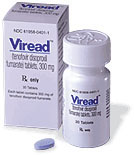Viread Side Effects
Serious Side Effects of Viread
Serious, adverse reactions
adverse reactions may be caused by Viread. Call your doctor
at once if you have any of these symptoms:
- jaundice (yellowing of the skin or eyes), upset stomach or stomach pain, darkened urine and clay colored stools can be signs of liver damage
- infection: fevers, chills, soreness of the throat, bruising easily, abnormal bleeding, upset stomach and sores in the mouth
- depression and nervousness
- high cholesterol
- sweating, trembling hands, feeling anxious or agitated and trouble sleeping
- diarrhea, abnormal bowel movements or trouble controlling your bowel or bladder
- rapid weight loss
- changes in menstrual cycle
- inflammation of the neck or throat (thyroid)
- strong pain in the lower back and lack of bladder of bowel control
- trouble walking, breathing or eating, speaking or seeing
- changes in the location or appearance of fat on the body, particularly fat in the arms, legs, face, neck, breasts or waist can signify angiodema
Common Side Effects of Viread
- mild nauseousness
- diarrhea
- gas
- headache
- sinus infection
- sore throat
- dizziness
- itchiness or skin rash
- difficulty sleeping
- minor loss of strength
- inability to have sex or loss of desire to have sex
Lactic Acidosis and Viread
Viread may increase the possibility of developing
lactic acidosis. This is a s
erious condition that requires
immediate medical attention.
Symptoms of lactic acidosis may include the following:
- loss of strength
- feeling numb or cold in your arms or legs
- stomach aching or cramping
- persistent vomiting
- rapid or irregular heart rate
- feeling dizzy or drowsy
- difficulty breathing
- weight loss
Warnings & Recalls for Viread
Viread Black Box Warnings
Viread has received a black box warning due to the
risk of patients developing
lactic acidosis (buildup of lactic acid). See "
Side Effects" tab for information about signs of this imbalance. If you have symptoms of lactic acidosis,
seek medical attention immediately. Viread has also received this warning due to the
exacerbation of hepatitis B in patients who suffer from this condition. Patients with hepatitis B should be closely monitored for symptoms in the initial stages of treatment .
Viread and Pregnancy
Viread is an FDA
pregnancy Category B medication. Viread is
not known to cause harm to the fetus if taken during pregnancy. However,
HIV infections may be passed to the baby and should be treated. Viread can be passed through breast-milk to a
nursing baby.
Do not breastfeed your baby if you have
HIV or AIDS as it may be passed to the nursing baby. Patients being treated with Viread for hepatitis B
should not breastfeed.
Viread Interactions
Be sure to tell your doctor about
any medications, supplements, vitamins or herbal products you may be using. Some drugs
may interfere with Viread.
Do not use medicines containing adefovir or other medicines which may include a combination of tenofovir. Some drugs that may
interact with Viread include:
- other treatments for HIV or AIDS
- Hepsera
- lithium
- methotrexate
- pain killers
- arthritis medicines
- ulcerative colitis treating drugs
- medications for preventing the rejection of organ transplants
- antibiotics and antivirals
- osteoporosis or bone disease treaments
Limit your use of alcohol while taking Viread, this can cause further liver damage.
General Information
Let your doctor know about any of the following you may have
before taking Viread
- any allergies
- liver disease
- kidney disease
- bone disorders
- a history of drinking large amounts of alcohol
If you have HIV, avoid having unprotected sex with others. Also be sure not to share razors or toothbrushes to prevent spreading the infection.
Viread Treatment and Use
Viread |tenofovir is an antiviral nucleotide reverse transcriptase inhibitor (NtRTIs) class medicine marketed by Gilead Sciences and approved in 2001 for treating human immunodeficiency virus (HIV) and Hepatitis B. Viread may also be prescribed for preventing acquired immunodeficiency syndrome (AIDS) in patients who have HIV, or for treating chronic Hepatitis B.
Viread may be taken alone or with other medicines to treat these conditions.
Viread does not cure HIV or AIDS and should not be used to treat HIV in patients under the age of 2 or for treating patients under 18 years old with hepatitis.
How Does Viread Work?
HIV infections spread throughout the body by converting RNA to DNA and infecting cells. Viread works to prevent this by releasing reverse transcriptase into the bloodstream to block the process. When this reverse transcriptase forms DNA in the body, HIV is no longer able to reproduce in these cells and the growth of the infection is prevented.
Viread Dosage Information
Viread comes in tablet or powder form to be taken orally.Take Viread only as directed by your doctor. Use all medications prescribed to you by your healthcare provider for treating your condition. If you have kidney or liver disease or disorders, your doctor may lower your dose of Viread to prevent harm.
Viread is typically prescribed as a 300mg tablet to be taken once every day with food. Swallow pills whole with a full glass of water.
Viread oral powder should be mixed with soft foods, such as applesauce or yogurt. Viread powder should not be combined with a liquid.
While taking Viread, your liver function and blood may need to be tested on a regular basis.
Other Names for Viread
Brand name:
Generic name:
Lawsuits & Legal Information for Viread

 adverse reactions may be caused by Viread. Call your doctor at once if you have any of these symptoms:
adverse reactions may be caused by Viread. Call your doctor at once if you have any of these symptoms: